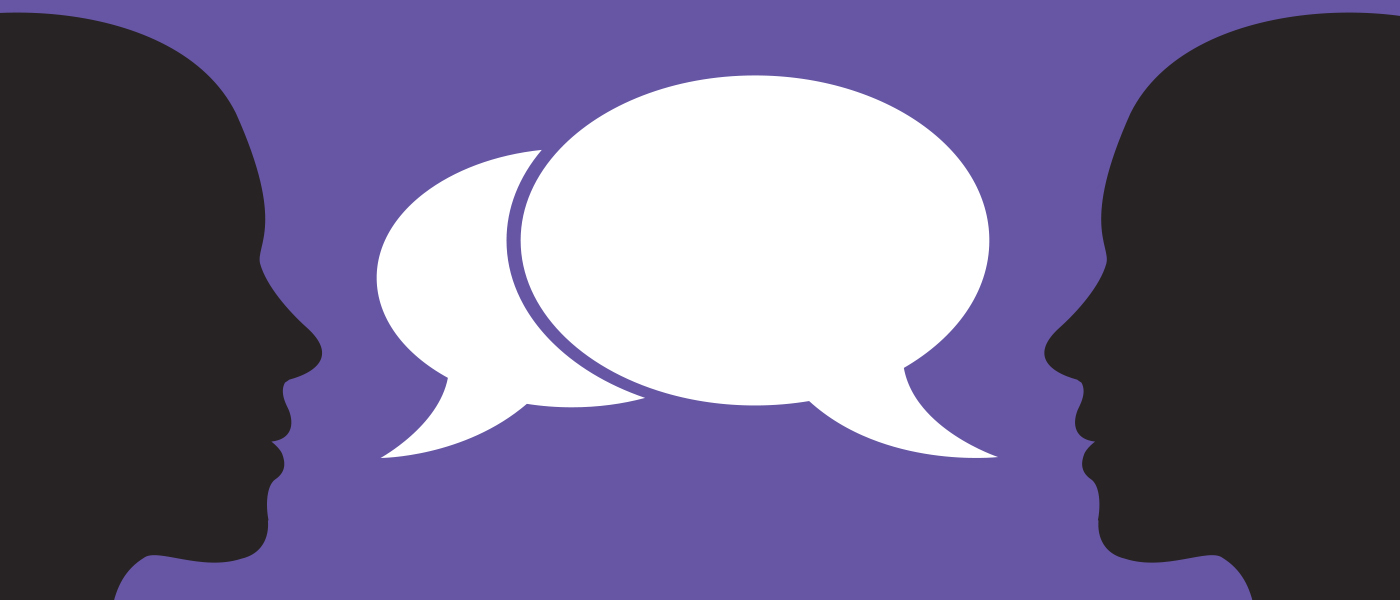
In conversation: beating the odds
Joshua Hewitt (MBChB 2023) is a doctor in his first year working at Glasgow’s Queen Elizabeth University Hospital. He and first-year medical student Nuriya Abuu both attended Springburn Academy in the north of the city, a school which is in one of Scotland’s MD40* postcodes – socioeconomically disadvantaged neighbourhoods where the number of pupils who go on to attend university is lower than that in wealthier areas. They both participated in the University’s Reach Programme, which aims to widen access to professional degrees, including medicine. They then secured places at UofG thanks to the Glasgow Access Programme (GAP; now renamed Gateway to Medical Studies), which promotes equitable access to medical school. Nuriya and Joshua met up at the Wolfson Medical Building (right) for a chat about their experiences.
JOSHUA: Nuriya, what made you think medicine was even possible from someone of your background?
NURIYA: I didn't think about my background much until I attended a GAP conference in early 2023 – that’s when I found out about the different entry requirements for pupils from schools like ours, lower cutoff scores and things like that. But it's maybe also to do with my stubborn streak. When I was younger, anything someone told me I couldn't do, I proved them wrong. So when I was told there weren’t as many people getting into medicine, I thought, well, I'll just try harder!
JOSHUA: That’s good – I think having that motivation and determination to change the narrative is important with widening participation backgrounds. What strengths do you think students from backgrounds like ours bring to medicine that others might not?
NURIYA: I think it's that understanding of the wider context of everything. If you’re from a widening participation background, even if you didn’t personally experience hardship, you might know someone who did, or you might have seen it around.
"If someone's not from a WP background, they probably have no idea of how much it takes to access good healthcare or to access the basic necessities that someone needs to maintain their good health.” – Nuriya
JOSHUA: Yeah, I think it’s good to have that different perspective, because medicine is still very one-sided. And it does attract people from ‘posher’ backgrounds, let's say – which is fine; nobody can help where they come from – but we want to try and balance that out.
NURIYA: Did you think you would be able to make it in medicine, considering your background as well?
JOSHUA: I always wanted to do it, from about my third year of high school. I was aware of how difficult it was to get in, but I never really thought that the school I went to was a huge barrier. I think that was because my teachers were very positive, trying to motivate me to keep going and helping me to apply, despite the fact that they hadn't had many people at all from the school do the same thing. I think there was one person who went to medical school before me, a few years earlier.
"I never felt that because of where I came from, I couldn't go to university, but I was aware that it was unusual – particularly to do medicine.” – Joshua
NURIYA: That’s the good thing about Springburn – even if they don't produce a lot of medical students, they still maintain the positive attitude. All the teachers were really helpful through that process, pointed me to all the extra-curriculars I could do and helped me choose my subjects. They made the whole process easier.
JOSHUA: That's good – I presume they've had a couple of other people come through by now, so they've got more used to doing it.
NURIYA: Have there ever been moments when you felt like walking away from medicine? What made you stay?
JOSHUA: Well, after doing it for a year I can say it's a very tough career, compared to medical school – that is nothing like the responsibility of actually applying your knowledge to real-life scenarios and real patients. But I work less than full time, which is becoming a lot more common – you change aspects of your work to make it more manageable. ‘Less than full time’ is about 40 hours a week, so still quite full on! So I've never actually made plans for leaving medicine, but I've certainly changed what I've considered doing in the future. I wanted to do paediatrics, and that's kind of still in the picture, but I'm considering becoming a GP as well, just because it's a bit easier to have that work-life balance.
NURIYA: How hard was it transitioning from medical school into clinical practice?
JOSHUA: For me, it was one of the biggest changes I've ever experienced. It’s your first full-time job, you're dealing with lots of admin such as sorting out your pay and your pension. But then couple that with training, your portfolio [a junior doctor's record of development and training], and assessments on the job ... it never ends! It does depend on what kind of job you do – I started in geriatrics, which is a very well supported, ‘nice’ job. But if you start in surgery, for example, there aren’t as many people to ask questions to, and I can imagine having a much tougher time starting there. Are you up for the challenge?
NURIYA: It's daunting, but it’s totally fine. Up for the challenge – absolutely. How do you balance being true to your background with fitting in to the medical profession, which can sometimes feel quite traditional or elitist?
JOSHUA: I don't really change that much. I feel quite proud of having a regional accent. I remember there was a patient I was speaking to who asked what school I went to. He was really pleased when I told him it was Springburn. I think he'd previously been a teacher, and he was very happy that Springburn were producing doctors. So yeah, I feel proud to be on the wards and kind of fly the flag a little bit.
"Where you come from does matter, in terms of having that representation and visibility. Telling people not to say, ‘Oh, poor you! Look how well you've done!’ – but to say, ‘Look, people can do it. It is possible.’” – Joshua
I went back to the school a couple of years ago, to speak to some pupils who wanted to do medicine, to say, look, you can do it. I thought there would only be a few people, but I walked in and there was a full class. And you were at that!
NURIYA: I was there! I think I mainly remember what you said about the entry requirements. I thought, that's high, but if someone else can do it, I can as well. [the Gateway programme in fact requires lower grades for entry to medicine – see right].
JOSHUA: So how do you think that GAP equipped you to study medicine?
NURIYA: In first year, the first part of the anatomy was all from GAP, so it felt like it was just revision. So it helped us pass the exams, just having that basic knowledge – what about you?
JOSHUA: For me, it was like a little bridge from school to university, and I think that's why I felt first year a bit easier compared to people who came straight from school. Some of them were a bit ‘rabbit in the headlights’!
"I'm still thinking whether to do further study after my first degree – maybe an intercalated degree, where you finish with two degrees instead of one. My sister said, ‘You're crazy – medicine is hard enough, and you want to add another degree on top?’ I said, ‘I'm just THINKING about it!’” – Nuriya
NURIYA: So what were the practical challenges you faced as a student, such as money, housing, time – and how did you overcome them?
JOSHUA: I was lucky from a financial point of view. I was OK, I was living at home, but time was difficult. I was trying to balance studying with volunteering in a nursery – I was thinking of doing paediatrics then – and from a time perspective, it was particularly difficult around exam time. What keeps you going when your course gets really tough?
NURIYA: My family – having someone who tells you that they're proud of you and believes that you can do it. Although my youngest sister has said she is definitely not doing medicine! And that’s OK – it’s not for everyone and we all have our own path.
JOSHUA: It’s good that you’ve got that support. So what are your hopes for the life that you want to build once you’ve finished university?
NURIYA: I want to travel. I'm actually thinking maybe I'll start in medical school – we can do electives and you can choose where you want to go. So maybe I'll pick one place, move around, and see how it goes. I thought of going to Cyprus, Indonesia, Morocco...
JOSHUA: It's good to see how healthcare works in other countries. Then you come back and realise just how brilliant the NHS is. It has its problems, but actually, compared to a lot of places, it is amazing what people get.
NURIYA: What does success mean to you now, and has that changed over time?
JOSHUA: At medical school, I thought, I want to be a consultant, I want to do all these things. But then you come out and you think, OK, I still want to be a doctor, but with modifications. For me, it was going less than full time. I have Fridays off – it's becoming more common for people to do this. Before that, my longest week was 76 hours, and it nearly killed me! But that’s a lot less common these days. Being happy is what success means to me now.
*This refers to the Scottish Index of Multiple Deprivation, a tool used to identify areas of greater economic disadvantage.
This article was first published in June 2025.
Our commitment to widening participation
We make a significant adjustment for entry to Gateway to Medical Studies to broaden the WP applicant pool and provide an alternative pathway to medical studies by having a lower grade requirement. Read more about our general adjusted entry requirements and those for entry to medicine specifically.


